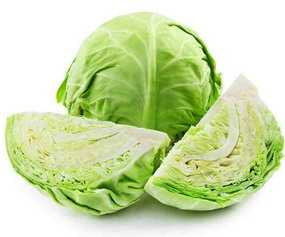Women Healthy -

Besides being used in various dishes, Cabbage also provides many health benefits. In fact, cabbage is rich in phytonutrients and other vitamins such as vitamin A, C and K. These are all natural antioxidants that help prevent cancer and heart disease, prevents free radicals. Cabbage is also a good source of dietary fiber, providing nearly 15 percent of the recommended daily intake. Fiber is very important to ensure the body's digestive system functioning at an optimum level.

Cabbage (Brassica oleracea) is a vegetable that include the type of Brassica or cruciferous family, which also includes broccoli, kale, and cauliflower. These vegetables can be grown in any type of soil, but grow well, especially in the fertile soil, the more fertile the soil, the faster the growth. Cabbage is one of the oldest vegetables and believed to have come from Asia and the Mediterranean. Nowadays, cabbage is one of the most widely cultivated plants in the world in tropical and semitropical
There are about 400 varieties of cabbage around the world in different shapes (from round to cone), size (from four to eight inches) and colors (green, white, red, and purple leaves). The most common are rounded light green. Cabbage is an economical and versatile vegetable that is easy to find in supermarkets and provides tremendous nutritional value. ThisvVegetables can be eaten raw or cooked, but it is often added to soups or stews.
Nutrition Fact of Cabbage
Fresh cabbage contain lots of vitamins (A, some B, C, and E). The content of Vitamin C is high enough to prevent scurvy (acute sprue). Contained many minerals such as potassium, calcium, phosphorus, sodium, and iron. Fresh cabbage also contains a number of compounds that stimulate the formation of glutathione, a substance required to deactivate the toxic substances in the human body.
But Cabbage also contains a number of compounds that can stimulate the formation of gas in the stomach, causing bloating (goiterogen substances). Cabbage leaves also contain glucosinolates that caused the slightly bitter taste.
| Nutritional value per 100 g based on USDA | |
|---|---|
Energy | 103 kJ |
Carbohydrates | 5.8 g |
Fat | 0.1 g |
Protein | 1.28 g |
| Thiamine | 0.061 mg |
| Riboflavin | 0.040 mg |
| Niacin | 0.234 mg |
| Pantothenic acid | 0.212 mg |
| Vitamin B6 | 0.124 mg |
| Folate | 43 μg |
| Vitamin C | 36.6 mg |
| Vitamin K | 76 μg |
| Calcium | 40 mg |
| Iron | 0.47 mg |
| Magnesium | 12 mg |
| Manganese | 0.16 mg |
| Phosphorus | 26 mg |
| Potassium | 170 mg |
| Sodium | 18 mg |
| Zinc | 0.18 mg |
Fluoride | 1 µg |
Health Benefits of Cabbage
Preventing cancer
Cabbage contains a cancer-fighting properties, including lupeol, sinigrin, diindolylmethane (DIM), indole-3-carbinol (I3C) and sulforaphane, which may help the defense enzymes and inhibits tumor growth. I3C and sulforaphane compounds in cabbage, both have been shown to enhance the anti-cancer effects of the chemotherapy drug Taxol. One study of Chinese women found that consumption of cruciferous vegetables (such as cabbage, broccoli, cauliflower and Brussels sprouts) is associated with breast cancer risk is significantly reduced.
Maintaining process of gastric
Cabbage is one of the best natural remedies for inflammation of the stomach (called gastric ulcers). A study at Stanford University School of Medicine found that fresh cabbage juice is very effective in treating peptic ulcers. Anti-inflammatory properties of cabbage is due to a high content of glutamine in it.
Anti-inflammatory
Cabbage is a good source of the amino acid glutamine and is believed to help those who suffer from any type of inflammation.
Boost the immune system
Due to high amounts of vitamin C, cabbage helps strengthen the immune system and help the body fight free radicals.
Prevent the risk of cataracts
Cabbage is also high in beta-carotene which helps protect against age-related macular degeneration and prevent cataracts.
Can Lose Weight
The cabbage diet is a good choice for those who want to lose weight. One cup of cooked cabbage contains only 33 calories only. That's why people who diet cabbage soup can be eaten in large quantities of soup without gaining weight, while still healthy.
Reduce the risk of Alzheimer's disease
Recent studies show that eating red cabbage can reduce the risk of Alzheimer's disease. Red cabbage contains vitamin C and anthocyanins, antioxidants to help reduce plaque in the brain, which may help prevent Alzheimer's disease.
Relieve Constipation
High fiber content in cabbage helps stimulate the digestive system, and thus relieve constipation.
Skin Care
Anti-oxidants in the cabbage help protect the skin from free radical damage known to cause signs of aging.
Relieve Muscle Pain
Cabbage contains lactic acid, which is known to help relieve muscle pain.
To get the maximum health benefits of cabbage, avoid undercooked because it can reduce the nutritional value especially vitamin C and remaining nutrients, will be more difficult to digest.
Cabbage can be eaten in many ways such as boiled, steamed, sautéed or grilled. But the most nutritious cabbage when eaten raw (of course after washing with water). Add raw leaves, sliced or shredded in salads vegetables to taste better.









